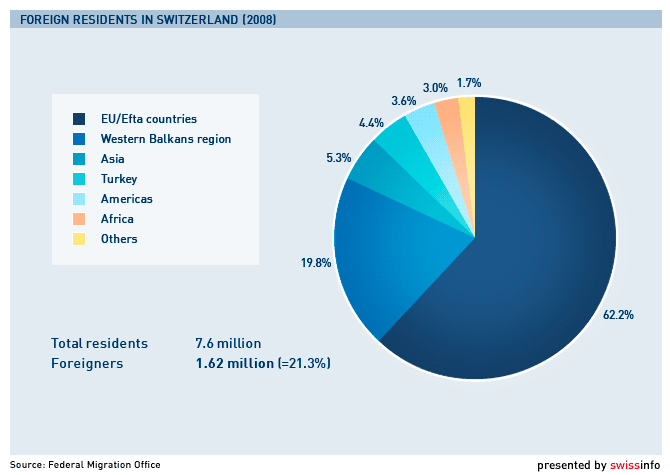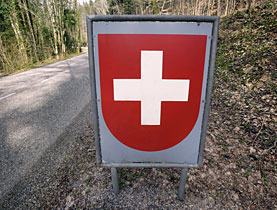Germans attracted to eastern Swiss job market

Germans have become the biggest immigrant group - not only in Zurich but across eastern Switzerland - taking the position Italians used to hold.
This development is largely the result of an agreement between Switzerland and the European Union granting mutual access to each other’s labour markets.
Walking through the doors of a public hospital in the St Gallen region you can’t help noticing the large number of German staff. What’s more, Swiss ears pick up a lot of standard German, rather than Swiss German dialect.
Figures back up the personal observation. About one in two doctors come from nearby Germany; one in three consultants and one in four nurses hail from across the border.
“We needed additional medical staff because doctors’ working hours were shortened,” said Hans Leuenberger, director of the St Gallen Cantonal Hospital.
He adds that it is impossible to find Swiss staff and the foreigners have integrated well. “The German staff are essential for us,” said Leuenberger.
The implementation of the EU labour accord prompted a trail of nurses from the east moving west: German health workers came to Switzerland, while Polish nurses went to work in Germany and Ukrainians moved to Poland.
Leuenberger is convinced this will not change if Romania and Bulgaria also benefit from access to the Swiss labour market. “The geographic distance here and there is too big for a wave of medical personnel from southeastern Europe,” he said.
Cross-border
The St Gallen region in 2007 posted its highest population increase for more than a decade, mainly as a result of immigration, which in turn was triggered by the economic upswing and the labour treaty with the EU.
At the same time the number of cross-border workers from neighbouring Austria soared to more than 8,300 people.
The SFS Holding Group active in fastening systems and automotive products employs about 400 Austrians at its site in Heerbrugg, making up 16 per cent of its workforce in Switzerland.
“But the high number of Austrian workers has nothing to do with the labour accord,” said company spokesman Christian Fiechter.
The number did not increase after 2002 since the region on both sides of the River Rhine has always been a unified economic zone, according to Fiechter.
He sees no integration problems for Austrians in the company as the mentality is similar – although there are linguistic differences. “They are willing to do shift work,” said the spokesman.
The agriculture sector does not find its labourers in neighbouring EU member countries except for the strawberry harvest, says the St Gallen Farmers Association.
“Conditions are tough, hours are long, so Germans and Austrians are the exceptions for us,” said the association’s Markus Ritter.
He hires mainly young trainees from the Czech Republic and Poland. “They are keen workers and want to put the know-how they have gained here to use at home,” Ritter said.
Zurich
Germans have also become the largest immigrant group – ahead of the Italians – in the region around Switzerland’s largest city of Zurich. In fact every other foreign worker had a German passport in 2007, according to the local statistics office.
The labour accord with the EU has had a lasting impact on immigration numbers and patterns in Zurich. The biggest increase came just over a year ago when quotas for residence permits were lifted for citizens from member states of the EU and the European Free Trade Association.
More than 66,100 Germans had registered in canton Zurich by September 2008.The trend has had repercussions for the high-end labour market. One hundred and sixty-five out of the 490 professors at Zurich University hailed from Germany.
“Zurich seems to be their favourite city. Top qualified Germans find a job more easily here and they earn more than at home,” said Joe Ferrer of the Statistics Office.
swissinfo, based on an article in German by Nathalie Grand and Daniel Wirth, Swiss News Agency

More
Free movement of people
German speakers are the largest linguistic group in Switzerland, which borders Germany and Austria in the north and east respectively.
The spoken language is a variety of Swiss-German dialects which differ considerably from the standard language used in most parts of Germany.
French speakers – living mainly in western Switzerland – make up about 20% of the population, while Italian accounts for 6.5% per cent and Romansh for 0.5%.
Switzerland is not a member of the EU but it has concluded 20 major bilateral agreements with the 27-nation bloc.
The labour accord, put into force in 2002 for an initial seven-year period, was extended to eight mostly eastern European countries in 2005 and is set for another extension in 2009.
Under the agreement Switzerland and the EU grant each other access to their labour markets.


In compliance with the JTI standards
More: SWI swissinfo.ch certified by the Journalism Trust Initiative










You can find an overview of ongoing debates with our journalists here . Please join us!
If you want to start a conversation about a topic raised in this article or want to report factual errors, email us at english@swissinfo.ch.